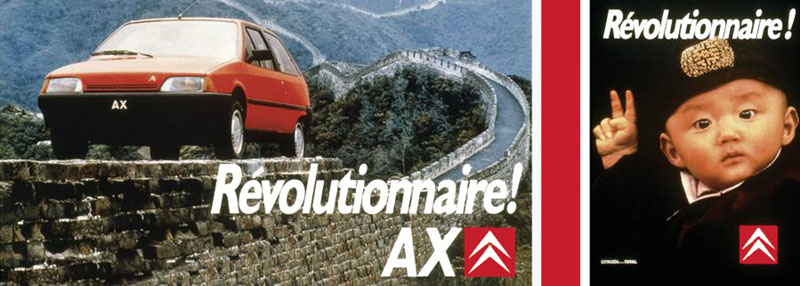|
The AX, ostensible replacement for
the Visa
, was launched at the Paris Salon in 1986
after six years of research into achieving
class leading fuel economy which
culminated in the ECO 2000 project.
Xavier Karcher promised at the
AX's launch in August 1986 that it would
not supercede the 2
CV while the latter continued to
sell...
In the event, the Visa soldiered
on until 1988 and the 2CV until 1990.
The AX was highly aerodynamic with a Cx
of only 0,31 which allowed the 1,0 litre
model to achieve a fuel consumption figure
of less than 4 litres/100 km (better than
70 mpg) at a constant 90 kph (56 mph).
The AX was launched in six
versions - 10E, 10 RE, 11 RE, 11 TRE, 14
TRS and 14 TZS, and one body style - a
three door hatchback.
The range was rapidly expanded
within a matter of weeks to include the
limited edition AX Sport equipped with a
twin carburettor, 95 bhp 1,3 litre engine
and a top speed in excess of 185 kph (115
mph).
In 1987, the range was further
expanded to include a new AX GT with 85
bhp, a lightly revised AX Sport and a
range of five door cars.
In 1988, a new 1 360 cm3 diesel
engine was made available in the 14 D, 14
RD and 14 TRD (or DTR in anglophone
markets).
In 1989, the 14 TZS disappeared
from the range and a new five door GT
appeared.
In 1990, the range was rebadged to
become 10E, 10 RE, 10 Tonic special
edition, 11 TGE, 11 TRS, 14 TRS, Sport,
GT, 14 D, 14 RD, 14 TRD/DTR.
In 1991, the 14 TZX replaced the
14 TRS while the 14 RD became the 14 TGD.
In 1992, the AX Sport was replaced
by the GTi with 100 bhp and 190 kph (119
mph) top speed and a 4x4 version was
introduced in some markets.
In 1993, the petrol versions were
all equipped with new monopoint fuel
injection engines (with the exception of
the GTi which retained its multipoint
engine) and the badging was altered yet
again and a number of special editions
were launched.
Also in 1993, the GT was replaced
by the AX Furio. Models were now
defined by engine and trim level - X, SX
and VSX.
The AX enjoyed great success
in competition
and proved very popular in the marketplace
too.
In 1998, it was finally replaced
by the Saxo
although it continued to be built in
Malaysia as the Proton Tiara.
Heuliez proposed this estate version
(below)
|



